Rustam Minnikhanov: ''How can the state language be voluntary?''
About how the State Council of Tatarstan resented the linguistic conflict in the republic but decided not to discuss this issue
On 26 October, Tatarstan authorities finally broke the two-month-long silence and spoke about the linguistic conflict at schools, which arose in connection with the order of Putin to check whether the residents of the regions were offered the opportunity to learn their native ethnic language at schools and whether it was voluntarily studied. The Prosecutor's office revealed numerous violations in schools, the blame for which was put on directors who only carry out instructions of the local ministry of education. MPs called to account Engel Fattakhov and Prosecutor Ildus Nafikov, subordinates of whom, as it turned out, until ten at night were calling school directors and threatened with criminal prosecution. The State Council couldn't conceal the vexed subject of teaching of the Russian and Tatar languages at schools, as well as to make a decision. Read the details in the material of Realnoe Vremya.
Deputies called the prosecutor and education minister to account
The discussion of the agenda of the State Council of Tatarstan has never been so passionately and ''with such pain'' held, said Chairperson of the State Council of Tatarstan Farid Mukhametshin. The initiative was taken by the beautiful half of the parliament, who usually modestly observed. The ladies in their speeches could not hold back emotions. Rimma Ratnikova anxiously said that 25 school directors complained about the prosecutors, who until 10 p.m. were calling and ''not only warning, but intimidating with administrative and even criminal cases.''
''Directors are called to prosecutor's office, asked to change the curriculum. They are given templates how should the timetable look like, require to remove the subject 'Tatar language' and replace it with 'Native language', which you know, is not the same. How can changing the curriculum in the middle of the academic year be possible? There is the order of the ministry of education that the academic workload of teachers, established in the beginning of the year, cannot be reduced on the initiative of the employer. On what basis is the advanced system of education of Tatarstan broken during the first quarter?'' asked Ratnikova the prosecutor of Tatarstan, Ildus Nafikov, whose subordinates suddenly began to find violations in schools, when ''you yourself have repeatedly confirmed that you have no claims to the language legislation.''
Another rebuke concerned the ministry of education of Tatarstan Republic. Tatyana Voropaeva called to account Engel Fattakhov, ''Fifteen hundred teachers of the Tatar language are being in a stressful situation: to leave school or to change the profile,'' but the minister remained silent.
''I am asking the minister of education to clarify this issue. I think that this should have been done a long time ago. I am asking the minister to give an answer today,'' demanded Voropaeva.
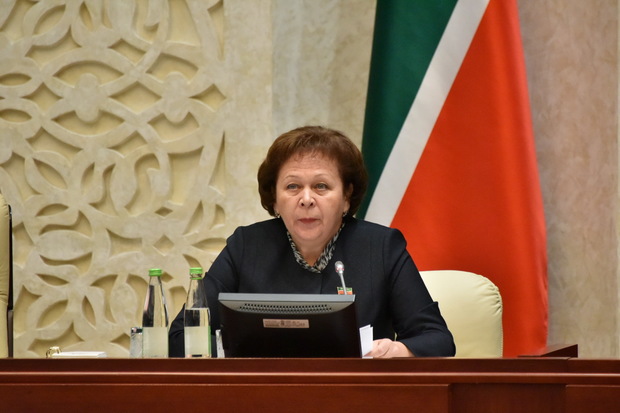
Only Deputy Nikolay Rybushkin took the side of the prosecutor of Tatarstan and education minister of education. He called the attacks on Nafikov unfounded: he is only doing his job. ''Why our law does not contain a word on compulsory learning? Why do we blame prosecutor's office and the ministry of education? What about us? Is the executive power not guilty?'' Rybushkin asked the audience the question.
''It is not their fault. Since in the spring the prosecutor stated that they were no violations of the education law, contradictions to the federal legislation ,'' answered to everyone Farid Mukhametshin and suggested, since the question of teaching languages in school was bothering parliamentary minds so much, to include it in the agenda.
''School directors must not be treated that way. We will organize the presidential elections soon together with them''
The suggestion was adopted unanimously, ''the parliament cannot escape this problem,'' but after half an hour the discussion of this issue was decided to postpone, again unanimously.
''Are we really ready to consider this question right now? Are the minister of education and prosecutor ready for the speeches? I think that today we are not ready. It needs time,'' Farid Mukhametshin literally saved Engel Fattakhov and Ildus Nafikov from the wrath of the deputies.
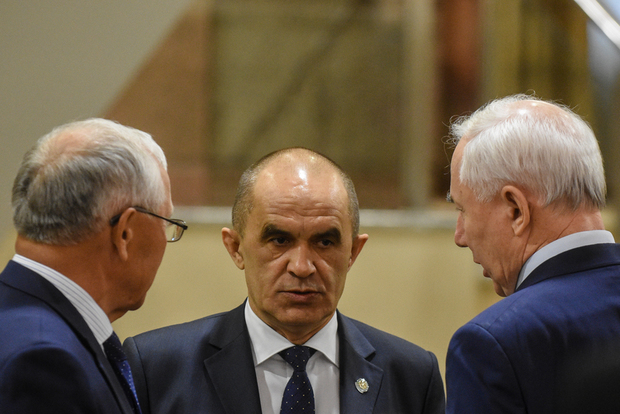
But the speaker did not save them from the wrath of Rustam Minnikhanov, who couldn't refrain from critics of Ildus Nafikov, who not only 'terrified' directors and teachers but almost jeopardized the 2018 elections, though asked not to discuss the issue that day.
''Today, school directors is the intellectual potential of our region. On the threshold of the election when all the electoral processes are carried out by our schools, directors, we created a kind of… Or is it specially done so that in Tatarstan there was a bad attitude to our President Vladimir Vladimirovich Putin? How could they even come up with such an idea. I am addressing to you, Ildus Saidovich, as to the Prosecutor. I have told you: if you have any complaints, please contact me, engage me, engage Mukhametshin. But why terrorizing school directors. This is our people, after all! How can you work with people like that. Ildus Saidovich, I beg you — school directors are not responsible. You should have told the leaders [of the prosecutor's office] in the districts and cities, they must comply with the etiquette. School directors must not be treated that way. I'm supposed to organize the presidential elections soon. How can these things be done before the elections? We will report to you, we are also subordinated people who are responsible to the head of the state, but you shouldn't change everything using force all of a sudden. You've created so much tension, although the arrangement was that we needed time and in these matters we were going to restore order,'' the president expressed dissatisfaction with the actions of the prosecutor's office, drawing attention to the fact that, adopting the curriculum, heads of educational institutions ''followed the instruction, the system that we already exists.''
''Now opposition forces are trying to be supporters of the Tatar language''
As for the system, Minnikhanov acknowledged that, ''probably, it was necessary to make some adjustments.'' ''I agree, we need to work on methodology, the amount of academic hours, so that the load on children was… We understand these issues and are working on the issue.'' Now Tatarstan is trying to find a compromise with the federal ministry of education. A curriculum has been proposed when Russian language will be brought up to the volume recommended by the ministry of education, in the senior classes the Tatar language will be voluntary, and in primary and secondary school — mandatory, however, it is unclear in what volume.''
''How can the state language be voluntary? It is nowhere in the world like that. Show me where it exists? Yes, it is voluntary in Switzerland, where they choose two languages out of four. But we have one state language — the language of our subject,'' Rustam Minnikhanov said.
The president of Tatarstan responded to the accusations in his address. The activists from groups for the compulsory study of the Tatar language in schools, unhappy with the silence of the authorities, has launched a meme, in which they reproached Minnikhanov that he spends time in trips abroad instead of solving the language problems.
''If someone wants to say that the president of Tatarstan is not working on the problem — I am, do not politicize. It [the situation] is being out of bounds too much. Now opposition forces are trying to be supporters of the Tatar language to sow discord between the Russians and Tatars. It is unacceptable for us,'' said Minnikhanov.
Minnikhanov asked not to discuss the Tatar language anymore: ''We will have the results of our work with the ministry of education. We'll report to you how the work goes. With this in mind, today's discussion I would ask to move and bring the necessary work to its logical end.''
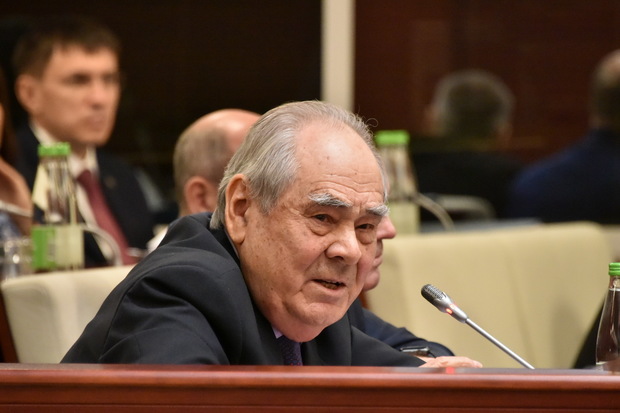
Complying with one law, we break the other: there is no exit from the legal conflict yet
Only one person in the audience violated Minnikhanov's request, and they could not refuse to him. Mintimer Shaimiev agreed with everything in general but made a remark:
''What is the urgent need in the middle of the academic year, all of a sudden? It is immoral to encroach on the whole educational process. The suggestion is following — until the end of the school year we should continue to work constructively, without interfering in the educational process,'' advised Shaimiev.
Not only education ministry but also deputies will have to work on this. The conflict with the study of the Tatar language emerged including due to legal collisions. If the law on education and law on the languages of Tatarstan are about learning the state languages of the republic, then the federal educational standards and curricula do not contain the concept ''state language of the subject'', they have the ''native language'' instead, which can be different from the state.
However, bringing in line the curriculum with the federal state standards, it is possible to break other local law — on equal volumes of the study of Russian and Tatar languages, because if the academic hours of Russian will be increased and of Tatar — not — this norm will not be executed.
How to get out of this situation, ''we have no answer to this question yet,'' said chairman of state Council Committee on education, culture, science and national issues Razil Valeyev. The parliament will have time to think about that: the 33rd meeting of the State Council has not been closed but postponed. The discussion will be raised at the next session or after one session.
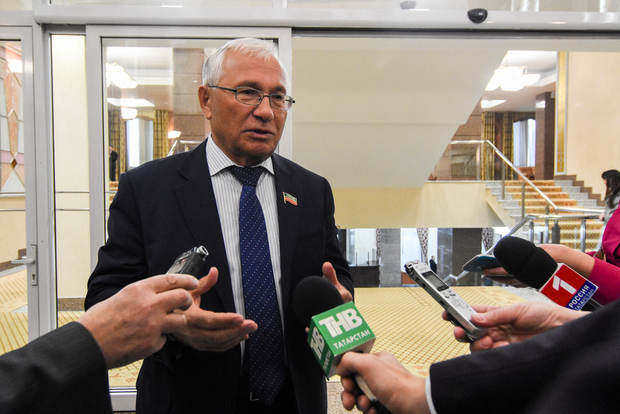
''No one will advocate for non-study of the Tatar language''
After the meeting of the State Council, Farid Mukhametshin told journalists about his opinion about the compulsory study of the Tatar language. He said that he supported the idea to consider this issue as they have questions to the ministry of education of the Russian Federation in the part of the federal standards, which, in their opinion, do not take into account some provisions of the Russian Constitution on the state and native languages. There are also questions to Tatarstan ministry of education because here we are talking about methods of teaching, volume and requirements to Russian-speaking and Tatar-speaking students. Mukhametshin also urged not to politicize the issue and noticed that we should not embroil people in the language issue because the decision has not been taken yet.
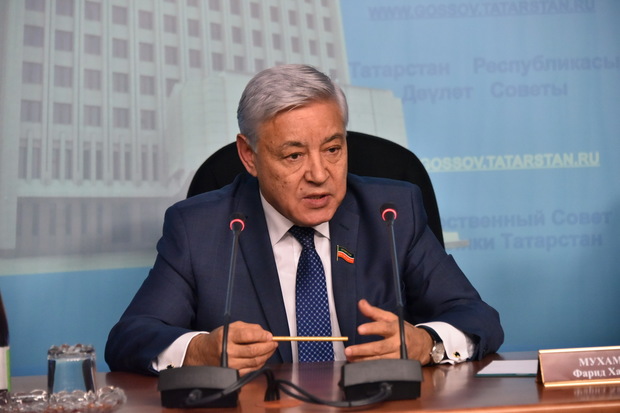
He reminded that that day the MPs voted to adjourn the meeting, but they would return to this issue in the near future and defend the mandatory study of the Tatar language.
In response to the question of Realnoe Vremya, Tatarstan State Council Chairman said that he had heard about the changes in some schools of studying of the Tatar language to two hours a week but believed that it should not be the decision of a school director and teacher. Prosecutors are also not entitled to make changes in the program — these issues should be handled by the ministry of education.